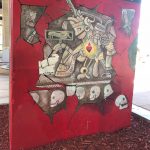This course, if we’re being perfectly honest, was both super fun but also a little bit of a mess. But don’t let that stop you, this quarter was the first time that HIUS 144 was supported, so some messiness is to be expected. I signed up for HIUS 144 after attending an event in the Cross Cultural Center advertising the course. I thought it would be interesting, especially the part about us partnering and volunteering with community partners. I was excited about the prospect of volunteering with fellow Black folks. The lectures themselves were pretty cool, including the guest lecturers. I actually knew Professor Amubaye, who lectured in Week 4, from his being my TA for an African-American Studies class I had my freshman year.
The actual lecture part of the 3 hour block was very much educational and fun. The one problem I had was how the workshops on recording and transcribing interviews were split up into several weeks’ time slots. Since the quarter is divided up into 10 weeks, we don’t have much time to meet up with our community partners, work with them, meet the other folks who work there, and figure out who to interview. That whole process, if my experience means anything, should be done by Week 5. This iteration of HIUS 144 had us still in the process of figuring out the process of recording during Week 6.
I myself, because I was only available Tuesdays and Thursdays each week, coupled with how I was unlucky enough to have various doctor’s appointments on Tuesdays and Thursdays in the middle of the quarter, not to mention my own laziness, meant that I didn’t actually start volunteering with United Women of East Africa until Week 5. After that, it was a mad dash to meet people, network, find an interviewee, and transcribe what turned out to be an hour-long interview.
If we’d been taught everything that we need to know about picking an interviewee, recording and transcribing early on, there’d be no confusion on the process, and the rest fo the quarter would be spent putting that process into motion. However, my criticisms don’t make HIUS 144 any less worthy of any future student’s time. As I mentioned in my interview with Agazit, I realized that while these children may not need me specifically to help them, as there’ll always be people to come help them study, I realized that my presence there was beneficial to me, that I felt like *I* needed to help these children, for myself.
I guess personally, I feel at my best when I’m helping others, making others feel happy. At the same time, working with UWEAST personified the reality that we are all, on some level, the same. But in addition, working with UWEAST, even on such a limited basis, makes me feel like I should be grateful for the life I live. Change the circumstances, and I’m one of these kids, or any one of their family members who faced such hardship that they had to leave their home to a country that isn’t all that hospitable to people from other countries, especially if the people themselves aren’t… shall we say… white.
The interview process itself was stressful. Because of the limited basis under which i volunteered, I only met so many people, who were already interviewed by the time I’d asked. They connected me with Agazit Tesfai, who is also a UCSD student. I’d never met Agazit in person, and to this day I haven’t met her in person. But I suppose my natural relatable awkwardness helped make up for that, because we’ve agreed to a to-be-determined Ethiopian coffee meet-up.
I would say that if you’re thinking about doing this class, make sure your evening schedule is somewhat open, and to Get. Started. Quickly. Don’t be a dumbass like me and get lazy early on, or you’re gonna have a bad time. But if you want to learn and connect to people, I can’t suggest a better course than HIUS 144.


